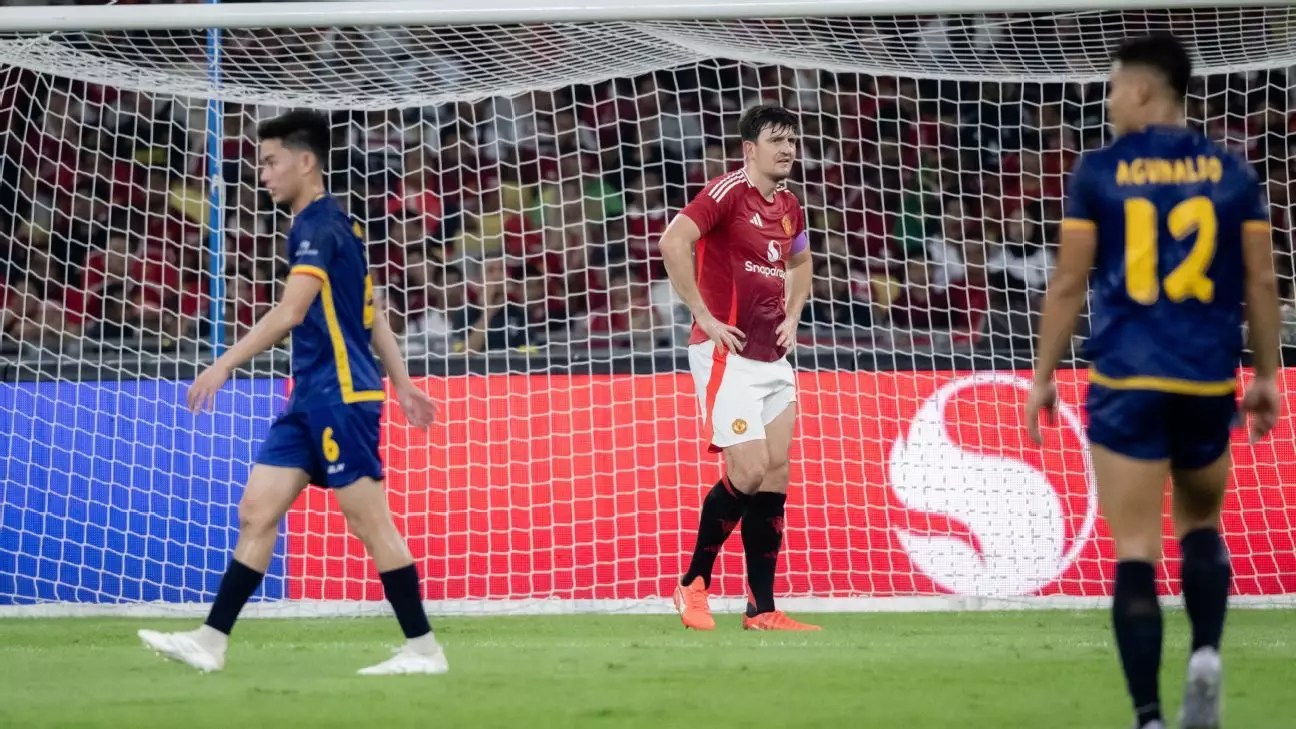In a spectacle that has left fans questioning the very soul of Manchester United, the recent 1-0 defeat against the ASEAN All-Stars epitomizes a club in disarray. The atmosphere at the Bukit Jalil National Stadium turned hostile as disappointed supporters greeted the final whistle with resounding boos, expressing their discontent over another lackluster performance. This exhibition match, part of the club’s post-season tours, was more than just a friendly; it represented a critical juncture for the team as they seek to redefine themselves after one of the most abysmal domestic seasons in recent memory.
The backdrop of the match was already mired in disappointment. United was reeling from a 15th-place finish in the Premier League, marking their worst season in history. Fans entered the Kuala Lumpur stadium with a glimmer of hope following a 2-0 victory over Aston Villa, but that light quickly extinguished as Maung Maung Lwin scored a second-half goal, highlighting the inadequacies of a team filled with pressure and expectations.
Managerial Challenges in the Spotlight
Ruben Amorim, the United manager, gave a candid post-match analysis that could resonate with many. “I’m always guilty of the performance of the team,” he stated, a sentiment that felt both honest and agonizingly familiar to those who have followed the club’s recent trajectory. His acknowledgment of the boos as a reflection of fans’ frustrations was a sobering moment. Yet, it raised the question: how long can a manager shoulder the blame before change becomes imperative?
Despite fielding a lineup that included high-profile players such as André Onana and Harry Maguire, the team’s performance stuttered yet again. Amorim’s strategy to rotate players in an effort to gauge potential for the upcoming season clearly backfired, as the squad could not overcome a group of regional players determined to showcase their talent on a big stage. The absence of cohesive play and aggression threw United’s ambitions into stark relief, revealing the gaps between expectation and execution.
Injuries and Absences: A Double-Edged Sword
The response to the management of player fitness and injuries further complicated matters. Amorim indicated that while caution was taken to avoid injuries, the absence of agile, impactful play left fans yearning for a more dynamic presence. In a world where results are paramount, the notion that simply ensuring player safety is a victory pales against the weight of failed expectations. The phrase “we should win these games” echoed with an overt sense of urgency, suggesting that the players and fans are both craving a turn of fortune in the upcoming season.
While no injuries may be a positive takeaway, the overall performance signalized that Manchester United is far from achieving their potential. If this friendly, the last game before the team splits for the summer, is any indication, the path forward demands serious re-evaluation.
Transitional Talks: Speculating Future Moves
Amidst the mist of discontent and introspection, the question of player acquisitions looms large. While Amorim refrained from addressing specific transfer news regarding Wolverhampton’s Matheus Cunha, the comments from CEO Omar Berrada provided a glimpse into the club’s planning for the future. He emphasized a sound strategy—one which has been under development for months—as a fundamental element for rejuvenating the squad. Only time will tell if these plans translate into meaningful improvements.
The dialogue surrounding improvement plans speaks to a broader issue facing the club as they navigate through a tumultuous period. Supporters are hopeful for the dawn of a revitalized Manchester United, yet the skepticism illustrated by recent fan reactions suggests that the road ahead is fraught with challenges. With ambition running high, the imperative remains: can this iconic club reinvent itself without losing its identity?
As the team prepares for their next challenge against Hong Kong’s national group, all eyes will be on how quickly they can transform impending setbacks into a rallying cry for resilience. Fans shout for strength, not just in skill, but in spirit—this is the core essence Manchester United must reclaim to ensure that the legacy of the club remains inviolable.


Leave a Reply